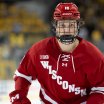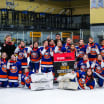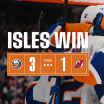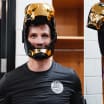At first, Bill Torrey didn't recognize the little guy and neither did Bill's sidekick, Ed Chadwick.
The pair, who comprised the baby Islanders entire high command, were minding their business strolling along Montreal's Sainte-Catherine Street. The 1972 Draft had been held and now they were plotting the Isles future.
The Little Guy instantly recognized the Isles duet and shook Bow Tie Bill's hand. Jim Devellano told them that he was looking for a hockey job and maybe the Islanders' General Manager could help him out.
Maven's Memories: Jim Devellano, The Other Architect
Stan Fischler profiles Jim Devellano, Director of Scouting from the dynasty era
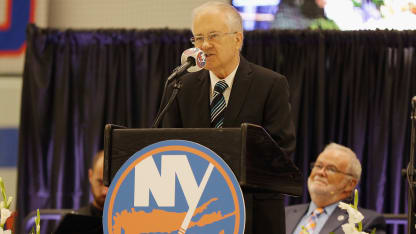
© Andy Marlin/Getty Images
By
Stan Fischler
Special to NHL.com
As luck would have it, Torrey eventually would help The Little Guy and in due time, Jimmy D would be as responsible for building the Nassaumen into a dynasty as Bow Tie Bill.
"I was just hanging around in Montreal at my own expense," Devellano remembered, "And by accident I ran into these two guys. I shook their hands. Torrey was gracious to me, so we chatted."
Jimmy met the right guy at the right time and at the right place. Torrey was in the process of hiring a staff. He needed scouts in hockey-rich Ontario. Coincidentally, that was the area Devellano knew best.
The more they talked, the more Bow Tie Bill began recalling Devellano's name. Jimmy D had worked for the St. Louis Blues and did some side scouting jobs for the Toronto Maple Leafs and Philadelphia Flyers.
"Jim Gregory (Maple Leafs General Manager) told me about you," Torrey revealed. "He said you did a pretty good job for them."
MAVEN'S MEMORIES
WRITTEN COVERAGE
The 2003-04 Season
Mike Bossy's Road to the Islanders
The 2002-03 Homestretch
John Tonelli Five-Goal Game
Isles vs Leafs in 2002
The Amazing 2001-02 Season
Explosive Trades Launch 01-02
Denis Potvin's Breakout vs Rangers
The Sutter Brothers
Maven's Haven
A hockey nut since his Toronto childhood, Devellano actually launched his bird-dogging career as an unpaid scout in 1967 when the Blues entered the NHL in its first expansion.
Now, Jimmy was hoping Torrey would offer him a paying job to find talent for the team that soon would call it home on Hempstead Turnpike.
Devellano: "We chatted for a long time that afternoon, right there on the street. I wound up with a firm promise to meet with Torrey and Chadwick in Toronto the following month. I had my foot in the door."
Nobody could know it at the time but -- apart from Torrey -- Devellano would emerge as, "The Other Architect," a man responsible for finding and drafting more top players than anyone for the four-Cup dynasty.
What's more, it was Jimmy D who persuaded Torrey to select Al Arbour as the Islanders third coach when Bow Tie Bill was about to hire either Johnny Wilson or John McLellan. But we'll get to that coup later.
"Bill was a man of his word," said Devellano. "It was July 1972 and we met for the second time in Toronto. We chatted about the particulars of the job and the confidence and good feelings I felt about our sidewalk talk."
Torrey knew he had found his man and made Devellano an offer Jimmy could refuse, but he didn't.
Devellano: "Bill said he'd give me nine grand a year and that wasn't too bad because the Blues were paying me only eight grand. My territory for the Islanders would be all over Ontario, Quebec and the Maritimes."
Working now side by side with Torrey, Jimmy knew that their first order of business was to evaluate the club's acquisitions in the 1972 Expansion Draft. To put it mildly, Devellano was dismayed.
"We did make one good grab," he recalled with a smile, "and that was Billy Smith. As everyone now knows, he turned out to be a Hall of Fame goalie. But, really, other than our first pick, Billy Harris, that was it.
"Frankly, it didn't take long before we were known as the 'Hapless Islanders.' I knew from the get-go that I had my work cut out for me. We finished last and it meant I had to help Bill make the right pick for '73."
That would be the easiest move in Devellano's life as the Islanders "Other" Architect. Everybody knew that the prize, among all-time Draft prizes, was a defenseman.
A Night Celebrating Bill Torrey
In his autobiography, "The Road To Hockeytown -- Jimmy Devellano's Forty Years In The NHL," the author called the potential selection of Denis Potvin "a no-brainer."
But with two asterisks: 1. The new World Hockey Association; 2. The Montreal Canadiens.
Jimmy and Bow Tie Bill knew that the WHA had been signing NHL stars -- Bobby Hull being the most prominent -- and that Habs GM Sammy Pollock would offer the Isles a bundle of players for the first pick.
"We did our best," Devellano, "To play all angles. One was trading for Denis Potvin's older brother, Jean, and we got him from the Flyers. We figured that Denis would want to play alongside his older brother."
They were right. Offers from the WHA were tempting but Denis nixed them and Pollock's package of players didn't tempt Torrey. Once the prize backliner was signed, a bigger challenge faced the high command.
In the maiden season, the Isles went through two coaches, Phil Goyette and Earl Ingarfield, Now, it was time to find one who could start building a winner.
Devellano: "Torrey was sold on either one of two guys; both good men. One was Johnny Wilson, a former 'Iron Man' player, and the other John McLellan. Both had NHL experience and both were considered good choices.
"But there was a guy I liked a little better. This guy had two short shots at coaching the Blues when I worked for St. Louis. Unfortunately, he never got a chance to show what he could do there due to interfering ownership."
At this point, Devellano made a gutsy move that would -- in good time -- turn the Islanders into the best franchise in NHL history. He contradicted his boss and told Bow Tie Bill that he knew the best candidate.
It would be neither Wilson nor McLellan. Jim urged Torrey to include Al Arbour in the interviewing process and the General Manager agreed. He interviewed Radar on the Island and conceded that Devellano was right.
"Bill saw that Al had all the best qualities to coach," Jimmy revealed. "Radar had played for many years; he was an honest man, a hard worker and the kind of guy who inspired confidence in the people around him."
With Arbour behind the bench and the two Potvin's manning the blue line, the Islanders improved in one season from 30 points to 56 points. Torrey was appreciative and hiked Devellano's salary to $16,000.
By the 1973-74 campaign, Jimmy had a new title, Director of Scouting. He would report directly to Torrey and all major drafting decisions would be left to Devellano. "We were doing something special on the Island."
The ever-improving Billy Smith in goal got a competent sidekick when the Isles traded for Glenn (Chico) Resch. Another Devellano Draft special was left wing Clark Gillies, a future Hall of Fame left wing.
Now the club's core featured defenseman Dave Lewis -- one of Jimmy's first selections in 1973 -- also Bob Nystrom and Billy McMillan along with veterans Ed Westfall and Bert Marshall.
The Bottom Line was making the playoffs for the first time and that was accomplished in the spring of 1975. The club had a 33-25-22 season, good enough to enable them to meet the Rangers in the first playoff round.
Beating the Rangers two-games-to-one in the best-of-three series was considered a minor miracle and gave the fresh franchise New York bragging rights.
Devellano: "If we hadn't done anything else that playoff year, I swear that would have been good enough to make our season."
But it only got better.
After being down three games to none against Pittsburgh, the Isles did the unthinkable and won four straight and the series. Only one other team had ever pulled off such a feat, the 1942 Leafs.
In Round three, Arbour's skaters almost pulled off an encore. Down three games to none again, they won three straight but lost Game Seven to the Flyers.
As Director of Scouting, Jimmy D continued looking for more ways and means of fortifying the lineup. Next on the "Need List" was a center to make plays for Original Draft pick, right wing Billy Harris.
Once again the Torrey-Devellano duet found a pot-'o-gold only this time it was in Saskatchewan and the prize was center Bryan Trottier. Like Denis Potvin, Trots won the Calder Trophy and enjoyed a Hall of Fame career.
By this time Jimmy D and Bow Tie Bill were as close as pages in a book. In fact the Torrey-Devellano-Arbour trio was more like family than anything but everyone knew who was boss and his name was Torrey.
"But Bill didn't lord that authority over people," Devellano explained. "What Bill liked to do was hire good people and let them do their job. That made him the perfect manager. And I could get to flap my wings.
"I got a chance to develop the scouting system, run the farm team, and work with developing our players. Most important, I got to hire my own scouting staff and take full responsibility for our drafting."
Unquestionably, the 1977 Draft proved to be as big a bonanza for Torrey-Devellano, Inc. as both the Potvin and Trottier catch. The big fish in question was a lithe right wing from Montreal.
Once again, Jimmy had to step in and turn a near-bad-pick into a 14-carat-gold gem, Michael Bossy.
Mike Bossy once lit Bryan Trottier's hair on fire
"We were picking 15th which meant getting a real good one wasn't very likely," Jimmy D remembered. "Matter of fact, the Rangers had not one but two picks ahead of us."
Torrey and Devellano had Bossy and the Ontario Hockey League scoring leader, Dwight Foster, on their radar. Bossy could score, but couldn't check and would not fight.
By contrast, Foster was a good all-around player who would fight if necessary. At the drafting table, Devellano explained the merits of each player to Al Arbour. Jimmy D favored the scorer.
Al mulled it over and then turned to Devellano. "If you can assure me that Bossy isn't scared, then take him," Radar insisted. "I can teach a player to check but I can't teach a player to score -- and we need goals."
Astonishingly, all teams passed on Bossy and on the 15th call Torrey nabbed Michael The Magnificent. Devellano later credited his Quebec scout, Henry Saraceno, for lobbying in favor of the sharpshooter.
Devellano: "Drafting for the Islanders in those days was a real team effort and we decided as a group that Bossy was worth the risk, even with the toughness and checking questions.
"As it turned out, Mike was, without a doubt, the best pure goal-scorer I had ever seen. He never teed up his shots, just swoosh, and the puck was in the net."
I had a chance to accidentally watch Jimmy D in action one afternoon in Toronto. Devellano had been scouting a left wing who was skating for the WHA's Houston Aeros and now he was sitting across the table from Jim.
Three tables away in the Royal York Hotel lounge, I was sipping drinks with an editor of the Toronto Star. I suddenly turned left and there was Jimmy and Bow Tie Bill with another prize prospect.
John Tonelli was the player in question, accompanied by his agent Gus Badali. A few months later, the left wing was starring for the Isles and proved to be a pivotal gear in the Isles four-Cup dynasty.
But by the 1979-80 season, there still was no Stanley Cup sitting in the Nassau Coliseum trophy room. To change that state of affairs, it would take what many consider the best deadline deal in hockey history.
"We had already traded for tough defenseman Gordie Lane mid-way in the '79-'80 season," Devellano recalled. "And we had another coming in from the Olympics, Ken Morrow.
"It gave us a chance to produce a package -- defenseman Dave Lewis and right wing Billy Harris for a center. That's what we offered L.A. and how we wound up with 'The Missing Piece,' Butch Goring."
Goring, along with Lane and Morrow, were the additions that changed the Islanders fabric. Butch took a lot of pressure off Trottier; Lane was the missing, intimidating force and Morrow was an all-around ace on D.
"With them we were ready for a serious run at the Cup," Devellano smiled, "And we finally did it."
Almost a year to the day of the Goring trade, Torrey-Devellano, Inc. pulled off another whopper. They dispatched Chico Resch and Steve Tambellini to Colorado for defenseman Mike McEwen.
"We wanted Mike to be our second power play quarterback behind Denis Potvin," Jimmy asserted. "We could afford to give up Chico because Rollie Melanson was ready to step in as Billy Smith's back-up."
McEwen turned out to be as hoped and a major performer on the next three Cup teams. As it happened, Devellano was not around for the fourth and final championship season in 1983.
He had done his job so well that the Detroit Red Wings asked Torrey for permission, got it, and hired Jimmy D as General Manager in Hockeytown, USA.
In good time, Devellano would turn the Motor City skaters into champions as well but he never forgot his roots.
"Yeah," Jimmy D now the Wings' Executive Vice President, concludes, "It all started with that chance meeting with Bill on the sidewalk in Montreal!"
Who knew?


